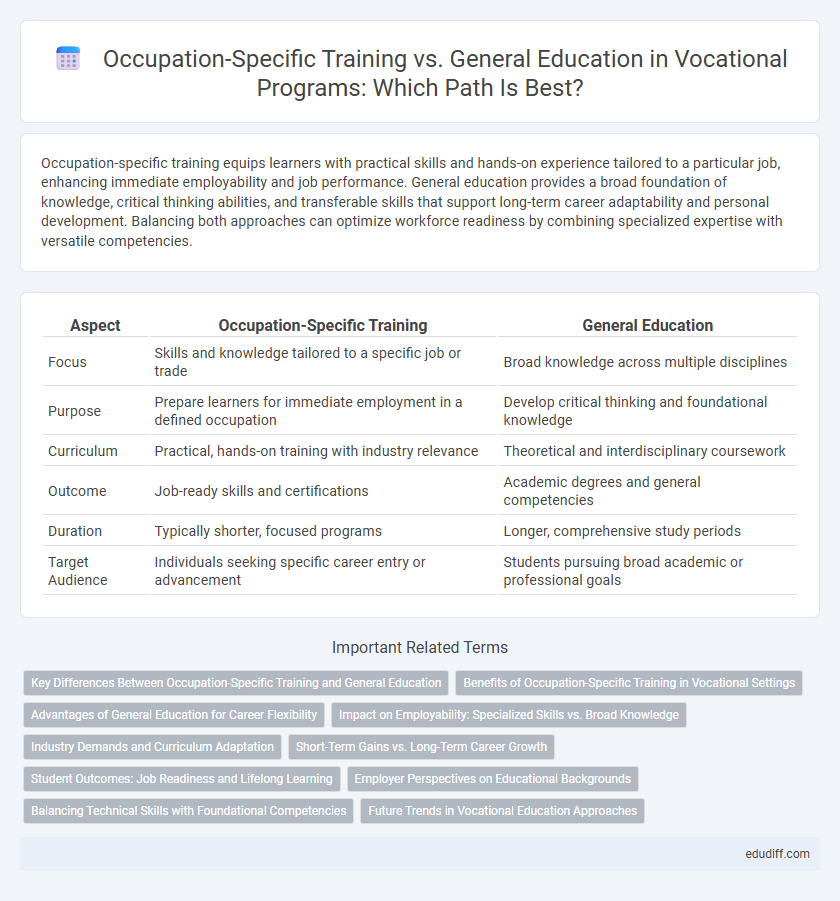Occupation-specific training equips learners with practical skills and hands-on experience tailored to a particular job, enhancing immediate employability and job performance. General education provides a broad foundation of knowledge, critical thinking abilities, and transferable skills that support long-term career adaptability and personal development. Balancing both approaches can optimize workforce readiness by combining specialized expertise with versatile competencies.
Table of Comparison
| Aspect | Occupation-Specific Training | General Education |
|---|---|---|
| Focus | Skills and knowledge tailored to a specific job or trade | Broad knowledge across multiple disciplines |
| Purpose | Prepare learners for immediate employment in a defined occupation | Develop critical thinking and foundational knowledge |
| Curriculum | Practical, hands-on training with industry relevance | Theoretical and interdisciplinary coursework |
| Outcome | Job-ready skills and certifications | Academic degrees and general competencies |
| Duration | Typically shorter, focused programs | Longer, comprehensive study periods |
| Target Audience | Individuals seeking specific career entry or advancement | Students pursuing broad academic or professional goals |
Key Differences Between Occupation-Specific Training and General Education
Occupation-specific training targets specialized skills and practical knowledge directly aligned with a particular job or industry, facilitating immediate workforce readiness, while general education emphasizes broad intellectual development and critical thinking applicable across multiple fields. Occupation-specific programs often include hands-on learning, certifications, and apprenticeships tailored to occupational standards, whereas general education fosters foundational competencies in subjects such as mathematics, communication, and humanities. The focus of occupation-specific training is rapid employability and skill proficiency, contrasted with general education's goal to cultivate versatile problem-solving abilities and lifelong learning potential.
Benefits of Occupation-Specific Training in Vocational Settings
Occupation-specific training in vocational settings accelerates skill acquisition tailored to industry demands, enhancing job readiness and increasing employability. Practical experience gained through hands-on learning bridges the gap between education and workforce requirements, resulting in higher productivity and employer satisfaction. Specialized training also supports career advancement by equipping learners with certifications and competencies directly relevant to their chosen occupations.
Advantages of General Education for Career Flexibility
General education offers broad foundational knowledge and critical thinking skills that enhance adaptability across diverse vocational fields. It equips individuals with versatile competencies such as communication, problem-solving, and digital literacy, which are essential for navigating career transitions in dynamic job markets. Emphasizing general education fosters lifelong learning and prepares professionals to respond effectively to evolving industry demands without being confined to a single occupation.
Impact on Employability: Specialized Skills vs. Broad Knowledge
Occupation-specific training enhances employability by equipping individuals with specialized skills tailored to industry demands, leading to higher job readiness and quicker workforce integration. In contrast, general education fosters broad knowledge and critical thinking, supporting adaptability across various roles but potentially delaying immediate job placement. Employers often prioritize candidates with occupation-specific credentials for technical roles, while overlapping competencies from general education benefit long-term career mobility and interdisciplinary opportunities.
Industry Demands and Curriculum Adaptation
Occupation-specific training directly aligns with industry demands by tailoring curriculum to the skills and technologies currently required in the workforce, enhancing job readiness and employability. This targeted approach allows for rapid curriculum adaptation based on emerging trends and feedback from employers, ensuring graduates meet specific sector needs. In contrast, general education offers broader knowledge but often lacks focus on immediate industry skill gaps, leading to longer transition periods before entering specialized vocational roles.
Short-Term Gains vs. Long-Term Career Growth
Occupation-specific training equips individuals with practical skills tailored to immediate job requirements, enhancing short-term employability and wage prospects. In contrast, general education fosters critical thinking and adaptability, facilitating long-term career growth and advancement across diverse industries. Balancing both approaches can optimize workforce readiness and sustained professional development in vocational fields.
Student Outcomes: Job Readiness and Lifelong Learning
Occupation-specific training enhances job readiness by equipping students with targeted skills and practical experience directly relevant to specific careers, resulting in higher employability and faster workforce integration. In contrast, general education fosters critical thinking and adaptability, promoting lifelong learning abilities that support career growth and transitions across multiple fields. Balancing both approaches optimizes student outcomes by combining immediate job preparedness with sustained personal and professional development.
Employer Perspectives on Educational Backgrounds
Employers prioritize occupation-specific training over general education for roles requiring specialized skills, as targeted programs ensure candidates possess practical knowledge directly applicable to job functions. Vocational training enhances workforce readiness by emphasizing hands-on experience and industry-relevant competencies, which improves employee productivity and reduces onboarding time. General education remains valuable for foundational skills, but employers often favor technical qualifications that match specific occupational demands for immediate job performance.
Balancing Technical Skills with Foundational Competencies
Occupation-specific training develops targeted technical skills directly applicable to a particular industry, enhancing job readiness and immediate productivity. General education fosters critical thinking, communication, and problem-solving abilities that provide a versatile foundation adaptable to various occupational contexts. Balancing vocational training with foundational competencies ensures a workforce equipped for both current technical demands and future career adaptability.
Future Trends in Vocational Education Approaches
Occupation-specific training increasingly integrates advanced technologies and real-world applications, enhancing job readiness and specialized skills in fields like AI, healthcare, and renewable energy. General education evolves to include foundational competencies such as digital literacy, critical thinking, and adaptability, ensuring graduates can navigate diverse and rapidly changing career landscapes. Emerging hybrid models blend occupation-specific expertise with broad educational frameworks, promoting lifelong learning and workforce resilience amid automation and economic shifts.
Occupation-specific training vs General education Infographic

 edudiff.com
edudiff.com